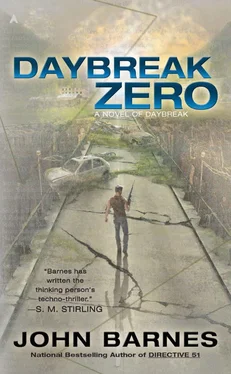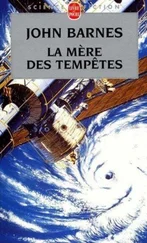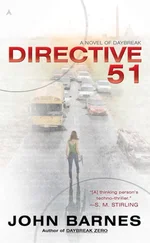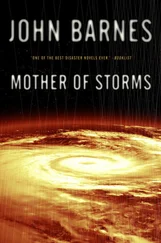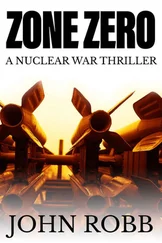“And radio,” the voice said. “We heard you on KP-1 and WTRC, Mister Manckiewicz. And if I’m not mistaken you’re also the narrator on Orphans Preferred and on A Hundred Circling Camps . You’re a celeb here.” A tall, rangy man walked out from the corner of the laundromat. “Although the biggest news this month, if not this year, is going to be that you caught me with my shadow showing, Mister Mensche.”
He might have been sixty, or eighty. His face was grooved, more eroded than sagging. His full head of hair was iron-gray flecked with white, he stood straight as any ex-soldier, and his muscles bulged and knotted over thick bones; he looked like the barely covered skeleton of a giant. His khaki pants and faded plaid shirt were neatly pressed. “My name is Scott Niskala. I’m the scoutmaster of Troop 17. Everyone, you can step out of cover.”
About twenty kids seemed to appear in a single motion. An instant later one tiny old lady in thick glasses stood beside Niskala. He said, “This, as you can probably guess, is Mrs. Niskala, who is—”
“—quite capable of introducing herself, thank you. Ruth Niskala. Scoutmaster of Troop 541. The outfit that shows the boys how to do things. We were thinking you might like to have a good meal and a good rest, and then maybe we can talk about what we might do for you.”
ABOUT 5 HOURS LATER. WAPAKONETA, OHIO. 6 PM EST. WEDNESDAY, SEPTEMBER 24, 2025.
The old stone church, headquarters for the Wapak Scouts, had a small library with wooden tables and chairs, where Larry, Chris, and Jason were treated to fresh biscuits and venison gravy. This was followed by hot baths (“There aren’t any regular scheduled baths right now so we have plenty of hot water for you”), and a long nap before dinner.
While they were napping, the Wapak Scouts insisted on cleaning and mending their clothing.
“Aw,” Larry tried to protest, “you don’t have to do this.”
Ruth Niskala said, very softly, “Let them do this. This is the day we’ve promised them for a long time, the proof of their faith, and the reason they’ve been good all year. Think of it as cookies for Santa. They need to do something for you.”
When they awoke an hour later, their freshly cleaned clothing was waiting for them. Scott Niskala guided them up the stairs, away from the main meeting hall. “They’re putting something together and they want it to be a surprise. And if you even try to tell the kids that they didn’t need to, I’ll knock you flat. Let’s go to my house across the way here.”
Except for the absence of electric lights in the gathering dusk, the room seemed as it might have been before Daybreak. “The first thing I’ve got to say is that there wasn’t any plan. We just made it up as it happened, and it kind of worked out.”
Larry Mensche said, “I don’t quite see why you weren’t just overrun by the nearest tribe; a few hundred crazy tribals could sweep through this town, burn everything, and slaughter everyone. Even if a hundred of them died doing it, Daybreak’d’ve counted that as a benefit—more burden lifted off Mother Earth. So how are you here?”
“Well,” Scott Niskala said, “that’s kind of a story, but it’s what I wanted to tell you about. Excuse an old man beginning at the very beginning, but it’ll be faster if I don’t try to edit. So to begin with, my father came from Finnish stock, and learned English mostly in school, from the Iron Country up in Minnesota. The Depression drove him out of his home…”
…and he bounced through crap jobs and work camps till 1942; then there was plenty of work for a healthy young man. In 1945 he got a slot in the Regular Army; in 1947, down in Georgia, he found himself a sweet farm girl who wanted to marry anything but a farmer, and in 1948, there I was.
My old man just assumed I’d follow him into the Army, so he trained me up as a good little soldier. I took to the hiking-camping-hunting, Daniel Boone kinda stuff, but my war was Vietnam, and when I got home it was the Hollow Army years. Sorta took the fun right out.
I did college, for the money, and majored in forestry, because it was outdoors. I did Forest Service, BLM, all that, but ended up managing state forests for Ohio. Along the way, when I was doing a stint at Ashley National Forest, I ran into Ruth here, who was a Mormon farm girl that went over the fence. Since we couldn’t have kids ourselves, it came kind of natural to foster.
We’d usually have four or five kids around the house; we adopted four of them in thirty years or so, when it seemed like the right thing to do, but mostly they just passed through, a year or two at a time, and then kept coming back to visit.
Eventually we retired here in Wapak. Ruth and I’d both been scoutmasters for so long, we just kind of went full-time with it. Our troops were closer to each other than they were to the national organizations, ’cause we agreed with each other more than we did with our nationals.
We were weird scoutmasters, I guess, or if you look at it my way, we were the only scoutmasters who didn’t get weird. We skipped out on all the urban crap, excuse the expression, where the kids just went to antidrug lectures and pep rallies and never out in the woods, because what’s the point of being a scout for that? And later on we didn’t let the council and the region ram Jesus into everything we did, either. We covered our asses, excuse the expression, with upper leadership, ’cause my troop turned out so many Eagles, and hers turned out so many Gold Awards.
Well, one thing we did, we found local business people to throw in money so all the County Orphanage kids could be scouts. Plenty of the hard-to-adopt kids end up living in those places, with no money for extracurriculars at school, or anything much else, so getting to be scouts was real big to them, and we had enough donors so our orphans could come on all the trips and camps.
We had our fosters, and most of’em’d keep coming after they moved home or moved on, and later on our old fosters brought their kids around. In just a few decades we had a real good bunch of dead-end kids with woods skills. By Daybreak all our assistant scoutmasters’d grown up in our troops, and we even had a few third-generation scouts.
Well, you might remember Ohio tried to evacuate right after the elections last year; this whole area was supposed to try to walk along I-75 down to Dayton to evacuate. Ruth said it sounded like something a couple interns might’ve thought up, looking at a map and counting beans. There couldn’t be enough food or shelter at Dayton, and besides the plan bet everything on good weather. Oh, we told them so, but people had been scared out of their minds since Daybreak day. So they didn’t listen to us; they bagged up what they could carry and left.
The room was dark and silent. Chris asked, “Was that the time of that first big storm?”
“Yeah. Three days after they left, freezing rain came down all one night and the morning after, then maybe four inches of snow with high winds the next afternoon. Once the weather cleared, I sent people south to take a look; they found lots of bodies in the highway ditch, especially kids and old people, all within thirty miles, but no survivors. Figure the ones who could kept walking or holed up too far from the road to hear the scouts calling.
“The last we heard of Columbus radio was on the twelfth, when they were begging the counties to send them help. Meanwhile the folks in town’d just abandoned the orphanage, so we took those kids in, and our five fosters stayed with us, and some other families just dropped their fosters on us before they walked out. Ruth and I had pritnear all the abandoned kids in Auglaize County, I think, plus around ten families who had stayed. We drew up articles and enrolled 164 Wapak Scouts, which is what we decided everyone would be.”
Читать дальше
